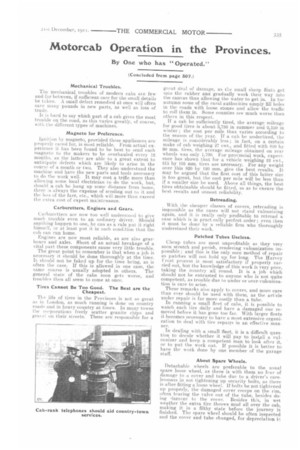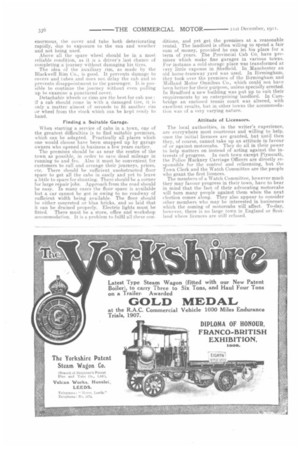Motorcab Operation in the Provinces.
Page 15

Page 16

If you've noticed an error in this article please click here to report it so we can fix it.
By One who has "Operated."
(Cunciuded from page 507.) Mechanical Troubles.
The mechanical troubles of modern cabs are few and far between, if sufficient care for the small details be taken. A small defectremedied at once will often save many pounds in new parts, as well as loss of trade.
Itis hard to say which part of a cab gives the most trouble on the road, as this varies greatly, of course, with the different types of machines.
Magneto for Preference.
Ignition by magneto, provided these appliances are properly eared for, is most reliable. From actual experience it has been found to be best to send each magneto to the makers to be overhauled every 12 months, as the latter are able to a great extent to anticipate defects which are likely to arise in the course of a month or two. They also understand the machine and have the new parts and tools necessary to do the work well. It may cost a trifle more than allowing some local electrician to do the work, but, should a cab be hung up some distance from home, there is always the expense of sending out to it and the loss of the fare, etc., which will more than exceed the extra cost of expert .maintenance.
Carburetters, Engines and Gears.
Carburetters are now too well understood to give much trouble even to an ordinary driver. Should anything happen to one, he can as a rule put it right himself, or at least put it in such condition that. the cab can run home.
Engines are now most reliable, as are also gearboxes and axles. Short of an actual breakage of a vital part these components cause very little trouble. The great point to remember is that when a job is necessary it should be done thoroughly at the time. It should not be faked up for the time being, as is often the case. If this is allowed in one case, the same course is usually adopted in others. The general state of the cabs soon gets worse, and troubles then all seem to come at once.
Tires Cannot Be Too Good. The Best are the Cheapest.
The life of tires in the Provinces is not so great as in London, as much running is done on country roads and in heavy country at times. In many towns the cerporations freely scatter granite chips and gra\ el on their streets. These are responsible for a great deal of damage, as the small sharp flints get into the rubber and gradually work their way into the canvas thus allowing the water to get in. In the autumn some of the rural authorities simply fill holes in the roads with loose stones and allow the traffic to roll them in. Some counties are much worse than others in this respect.
If a cab be sufficiently tired, the average mileage for good tires is about 3,750 in summer and .3,150 in winter ; the cost per mile thus varies according to the season of the year. If a cab be under-tired, the mileage is considerably less ; in fact, on a certain make of cab weighing 27 cwt., and fitted with 810 by 90 mm. tires, the average mileage obtained on rear wheels was only 1,700. For provincial work, experience has shown that for a vehicle weighing 22 cwt., 815 by 105 mm. tires are necessary. For any weight over this 820 by 120 mm. give the best results. It may be argued that the first cost of this latter size is too great, but the cost per mile will be less than if a smaller size be used. Above all things, the best tires obtainable should be fitted, so as to ensure the best results and utmost reliability.
Retreading.
With the cheaper classes of covers, retreading is impossible as the cases will not. stand vulcanizing again, and it is really only profitable to retread a case which is in pract.e.ally perfect order ; even then it must be done by a reliable firm who thoroughly understand their work.
Patched Tubes Useless.
Cheap tubes are most unprofitable as they very soon stretch and perish, rendering vulcanization impossible ; and this is the only sure method of repair as patches will not hold up for long. The Harvey Frost process is most satisfactory if properly carried out, but the knowledge of this work is very poor, taking the country all round. It is a job which should not be entrusted to anyone who is not quite competent, as trouble due to under or over-vulcanization is sure to arise.
These remarks also apply to covers, and more care than ever should be used with them, as the article under repair is far more costly than a tube.
In running a small fleet of cabs, it is possible to watch each tire daily and have a damaged one removed before it has gone too far. With larger fleets it becomes necessary to have a most extensive organization to deal with tire repairs in an effective manner.
In dealing with a small fleet, it is a difficult question to decide whether it will pay to instill a vulcanizer and keep a competent man to look after it, or to put the work out.. If possible it is better to shitraNff'e the work done by one. member of the garage About Spare Wheels.
Detachable wheels are preferable to the usual spare loose wheel, as there is with them no fear of damage to a cover and tube due to a driver's carelessness in nottightening up security bolts, as there is after fitting a loose wheel. If bolts be not tightened up properly, the damaged cover creeps on the rim, often tearing the valve out of the tube, besides doing damage to the cover. Besides this, in wet weather the extra tire throws mud all over the cab, making it in a. filthy state before the journey is finished. The spare wheel should be often inspected and the cover and tube changed, for depreciation enormous, the cover and tube both deteriorating rapidly, due to exposure to the sun and weather and not being used.
Above all the spare wheel should be in a most reliable condition, as it is a driver's last chance of completing a journey without damaging his tires. The idea of the auxiliary rim, as made by the Blackwell Rim Co., is good. It prevents damage to covers and tubes and does not delay the cab and so prevents disappointment to the passenger. It is possible to continue the journey without even pulling up to examine a punctured cover.
Detachable wheels or rims are the best for cab use : if a cab should come in with a damaged tire, it is only a matter almost of seconds to fit another rim or wheel from the stock which can be kept ready to hand.
Finding a Suitable Garage.
When starting a service of cabs in a town, one of the greatest difficulties is to find suitable premises, which can be adapted. Practically all places which one would choose have been snapped up by garage owners who opened in business a few years earlier.
The premises should be as near the centre of the town as possible, in order to save dead mileage in running to and fro. Also it must be convenient for customers to call and arrange their journeys, prices, etc. There should be sufficient unobstructed floor space to get all the cabs in easily and yet to leave a little to spare for shunting. There should be a corner for large repair jobs. Approach from the road should be easy. In many eases the floor space is available but a car cannot be got in owing to no roadway of sufficient width being availableThe floor should be either concreted or blue bricks, and so laid that it can be drained properly. Electric lights must he fitted. There must be a store, office and workshop accommodation. It is a problem to fulfil all these con
ditions, and yet get the premises at a reasonable rental. The landlord is often willing to spend a fair sum of money, provided he can let his place for a term of years. The Provincial Cab Co. have premises which make fine garages in various towns. For instance a cold-storage place was transformed at very little expense in Sheffield. In Manchester an old horse-tramway yard was used. In Birmingham, they took over the premises of the Birmingham and Midland Motor Omnibus Co., which could not have been better for their purpose, unless specially erected. In Bradford a new building was put up to suit their requirements by an enterprising landlord. In Cambridge an enclosed tennis court was altered, with excellent results, but in other towns the accommodation was of a very varying nature.
Attitude of Licensors.
The local authorities, in the writer's experience, are everywhere most courteous and willing to help, once the initial licences are granted, but until then they, of course, cannot take up an attitude in favour of or against motorcabs. They do all in their power to help matters on instead of acting against the interests of progress. In each town except Plymouth, the Police Hackney Carriage Officers are directly responsible for the control and relieensing, but the Town Clerk and the Watch Committee are the people who grant the first licences. The members of a Watch Committee, however much they may favour progress in their town, have to bear in mind that the fact of their advocating motorea,bs will turn many people against them when the next election comes along. They also appear to consider other members who may be interested in businesses which the coming of motoreabs will affect. To-day, however, there is no large town in England or Scotland where licences are still refused.




















